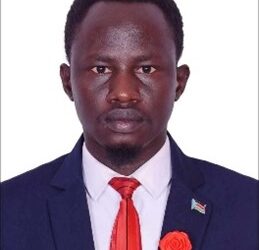By Gama Hassan Oscas
In a move that has sparked widespread outrage and disappointment, the South Sudanese Parliament, dominated by the Sudan People’s Liberation Movement (SPLM) party and its allied members, last week passed the budget for the Fiscal Year 2023-2024 without the participation of the SPLM-In Opposition (SPLM-IO) members. This budget passage has brought to the forefront several concerning issues that demand thorough scrutiny, particularly the disregard for the plight of South Sudanese security and civil servants who continue to suffer from abysmally low payments, forcing some to resort to corrupt practices for survival. As the government fails to provide accountability and deliver essential services to its citizens, the recent budget decision epitomizes the stark contrast between the extravagant spending by higher institutions and the dire socio-economic reality faced by ordinary South Sudanese.
The dire state of security personnel and civil servants’ wages is a glaring issue that has been swept under the rug for far too long. Reports of monthly salaries as low as US$ 10 have emerged, painting a grim picture of the financial struggles faced by these crucial segments of the workforce. The very individuals responsible for maintaining law and order, and delivering vital public services, find themselves struggling to make ends meet. Such conditions not only create an environment ripe for corruption, as highlighted by the user, but also undermine the morale and effectiveness of these essential sectors.
The crux of the recent parliamentary standoff lies in the disagreement over salary increments for civil servants and organized forces. While the SPLM members of parliament aligned with the finance ministry’s proposal for a 400% increase, the SPLM-IO and some members of the South Sudan Opposition Alliance (SSOA) pushed for a higher 600% increment to counter the crippling effects of inflation in the country. This divide underscores the severity of the economic challenges and the desperation felt by the citizens and the opposition, who advocate for a more robust increase to counteract the rapidly diminishing purchasing power of the South Sudanese pound.
The subsequent walkout staged by the SPLM-IO members further accentuates the deep-seated divisions within the country’s political landscape. The very essence of a functional parliamentary system hinges on collaboration, negotiation, and consensus-building. The inability to reach a compromise not only reflects poorly on the political maturity of the ruling party but also demonstrates a failure to prioritize the welfare of the citizens they are elected to serve. The SPLM-IO’s decision to walk out in protest was a bold step to voice their disapproval of a budget decision that neglects the very heart of the nation’s well-being.
The passing of the budget in the absence of the SPLM-IO members raises concerns about the overall democratic process in South Sudan. A vibrant democracy thrives on inclusivity, diversity of opinions, and open discourse. By sidelining a significant portion of the parliamentary representation, the ruling party sends a disconcerting message about its willingness to engage in meaningful dialogue. Furthermore, the move to disregard the concerns raised by the SPLM-IO regarding the salary increments for civil servants and organized forces hints at a lack of empathy for the average citizens’ daily struggles.
One of the most distressing aspects of the budget passage is the stark contrast between the frugal conditions faced by ordinary South Sudanese citizens and the extravagant spending seen in various government institutions, including the presidency. The lack of transparency and accountability in these institutions has time and again raised eyebrows and elicited public outrage. Budgetary allocations without a demonstrable impact on the lives of the citizens they are meant to serve reflect a systemic failure to address the basic needs of the population.
At the heart of the matter is the government’s responsibility to ensure the well-being of its security sector and civil servants. These individuals play a pivotal role in upholding the nation’s stability and delivering essential public services. By failing to adequately remunerate them, the government inadvertently undermines its own capacity to govern effectively. Furthermore, a government’s financial decisions should reflect its commitment to the citizens’ welfare, and the budget passage in question clearly falls short of this standard.
In conclusion, the recent budget passage in South Sudan’s parliament serves as a harsh reminder of the government’s failure to address the dire financial situation faced by security personnel and civil servants. The absence of the SPLM-IO members during this pivotal decision-making process and the subsequent parliamentary standoff underscore deep-seated divisions within the political landscape. The disregard for the concerns of the opposition, combined with the stark contrast between extravagant spending and the plight of ordinary citizens, paints a disheartening picture of a government that is disconnected from the realities faced by its own people. Moving forward, it is imperative that the South Sudanese government prioritizes transparency, accountability, and the welfare of its citizens to foster an environment of inclusivity and sustainable development.
The author of this article is an advocate and can be reached on email: oscarsgama@gmail.com




